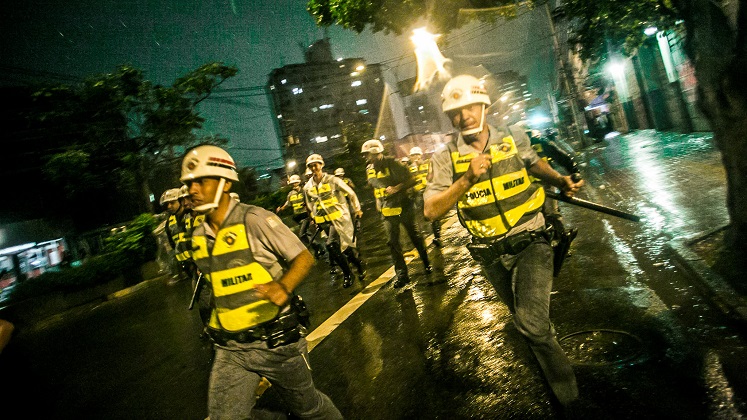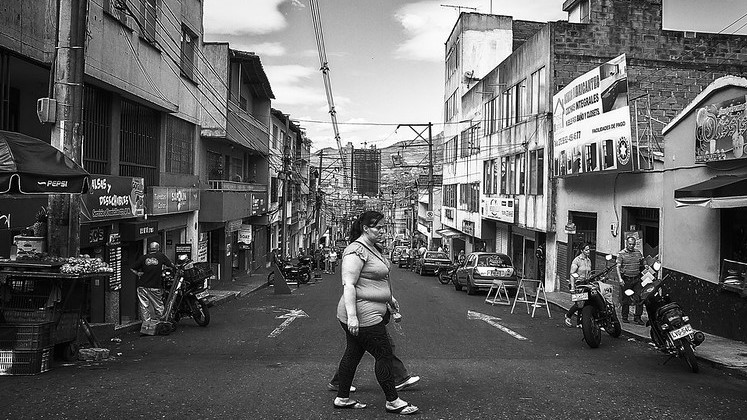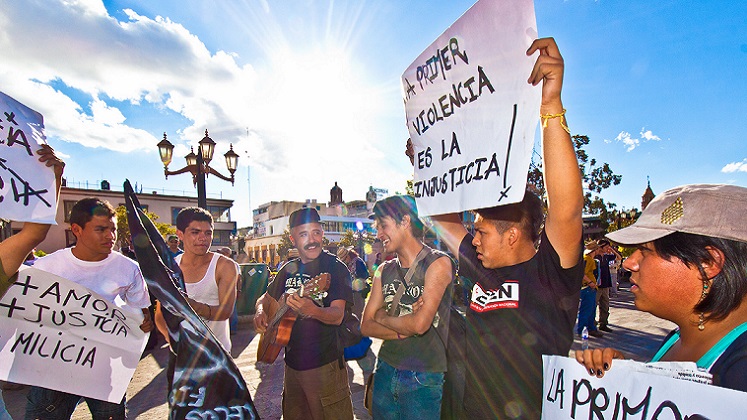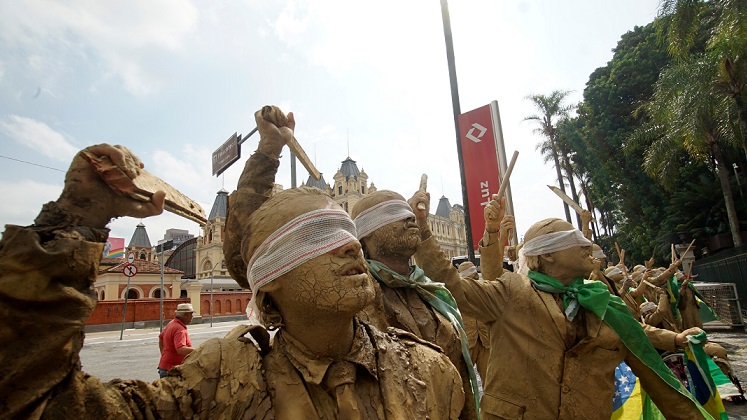In São Paulo, Brazil, many people fear crime. Some also fear the police, but can also tolerate extreme police violence. One of the keys to legitimate police power is procedural justice because it enhances legitimacy, normatively appropriate police behaviour and encourages people to self-regulate, as Jonathan Jackson (LSE & University of Sydney Law School), Thiago Oliveira (Oxford University) and Ben Bradford (UCL) found.
Leia este post em português
São Paulo is a place in which income, health, safety, and even the rule of law are distributed with stark unevenness. The city is very densely populated, with approximately 20 million habitants in the metropolitan area, but with enormous differences from one neighbourhood to another. In “Fear and Legitimacy in São Paulo, Brazil: Police-Citizen Relations in a High Violence, High Fear City”, recently published in Law & Society Review, we focused on a high crime, high police violence, low trust city, where force and power is implicit, and often explicit, in even mundane interactions between police and citizens, and where the image of the heavily militarised Polícia Militar de São Paulo (PMSP) as “just another (violent) gang” still has significant cultural currency.
Violence is a constituent part of sociability, as tacit threats of forcible behaviour come from various directions: crime rates are high; extra-legal governance by organised crime rules some territories in the city; and crucially, episodes of excessive and even lethal use of force by law enforcement agents are relatively frequent. Heavily armed officers routinely stop and question people at gunpoint, especially young black and mixed-race men in disadvantaged communities. Lots of people are killed by the police every month. São Paulo residents can be exposed to both police and neighbourhood violence and often hear stories of summary killings of gang members. On average, most people distrust legal authority and question its legitimacy, as public relations are marked by coercion and fear. Yet (somewhat counter-intuitively), some people fear police but at the same time tolerate and sometimes even support extreme police violence.
Contrary to work from contexts like the US, UK and Australia, we found that instrumental and normative authority relations are not easy to disentangle. The melding of coercive and consensual elements in the motivations that people have (or have not) to comply with legal authorities echoes the nature of aggressive policing enforcement and surveillance tactics in Brazil’s biggest city, where the possibility of violence can be palpable, even in relatively everyday police-citizen encounters.
In this context, we tested Tom Tyler’s procedural justice theory which has found much support in countries like the US, UK and Australia. Procedural justice theory posits that fair treatment and decision-making legitimises legal authorities in the eyes of those that the police serve, protect and regulate. Procedurally just approaches include treating people with dignity and respect, being open and accountable, explaining and making unbiased decisions. They also focus on listening and engaging with people and conveying trustworthy motives. Evidence suggests that the experiences of procedurally just policing, and the legitimacy it generates, is linked to voluntary cooperation and compliance, in ways that are more sustainable, durable and ethical than those based on the use or threat of force.
Process-based policing suggests a powerful lever for police reform. When people are willing to cooperate with police, comply with officer’s orders, accept their decisions, and obey the laws they enforce (because legitimacy makes this ‘the right thing to do’), this reduces the need for aggressive policing that risks normalising the ‘expectation of unquestioned compliance and authorises police to use physical force in its absence.’
Yet there is some evidence from South Africa, Ghana and Pakistan that effectiveness and corruption may be at least as important as procedural justice in defining the normatively appropriate (legitimating) use of power. In these countries, police have a long history of abuse of power, authoritarian approaches to social control predominate, and legal institutions may seem unable to provide a bare minimum level of security to all citizens. When modelling the predictors of legitimacy in these contexts, procedural justice is important, but so also is effectiveness and corruption and/or lawfulness.

Brazil provides an intriguing context in which to test procedural justice theory. Data were collected as part of two complementary studies that formed part of a larger project conducted by the Center for the Study of Violence of the University of São Paulo (NEV-USP) entitled “Building democracy daily: human rights, violence, and institutional trust”. The first study had a three-wave longitudinal design that aimed to assess the dynamics of attitudes towards legal authority among residents of eight selected neighbourhoods of São Paulo, and was conducted between 2015 and 2018. The second study was a cross-sectional representative sample survey of the population of São Paulo carried out in 2015. In both studies, we used standard statistical modelling techniques.
First, we examined the sources of police legitimacy. Contrary to prior expectations, we found that a relational conception of procedural justice was key to the police being seen as legitimate by citizens. Procedural justice is important because a fair process is a normative good in and of itself (everybody deserves fair treatment and fair decision-making, whatever social, political and economic groups they belong to), but our findings also suggest that procedural justice conveys inclusion and status, which helps to encourage a sense of trust in officers and the rightfulness of police power. It also proves that unfair treatment and biased decision-making signals of exclusion and denigration help to encourage distrust the police and withhold legitimacy.
Contrary to work from South Africa, this finding underlines that in some Global South contexts social values similar to those found in democracies in the Global North predominate. The Global South is not one big pool of ‘other’ countries in which police-citizen relations are homogeneously different from Anglo-American contexts. Ultimately, similar values probably mark authority relations in Latin America, particularly those found in Western contexts.
Consent vs coercion, or a bit of both?
We also considered the links between obligation to obey, fear of police, legitimacy and legal compliance. Prior studies in contexts like the US and Australia have found that normatively and instrumentally inflected authority-citizen relations are empirically distinct, and that legitimacy is a more important predictor of legal compliance than fear of sanction and punishment. The idea here is that, by tilting the authority-citizen relationship from coercive to consensual, legitimacy reduces the need for costly and minimally effective forms of crime control, opening up further space for policing strategies that prioritise consent over coercion.
Yet, we found that instrumental and normative authority relations could not be so easily disentangled in São Paulo. We found that for some a sense of obligation to obey the police was normative—they felt a normatively-grounded obligation to obey the rules and orders that emanate from a police institution that they felt wields its power in socially appropriate ways. Other people described an obedience that was prudential and/or essentially coerced, representing an instrumental motivation to comply based on fear of violence and intimidation. A third group said they did not feel a duty to obey officers, and went on to describe a defiance rooted in their belief that officers give immoral orders.
We modelled these different forms of obligation (or lack of obligation) to obey, and found that police-citizen authority relations in São Paulo could be usefully conceived along a coercive to consensual continuum. This continuum predicted legal compliance, moving from instrumental factors at one end, to ambivalence in the middle, and to a normative relationship at the other.
Those who reported less compliance with the law tended to fall on the coercive end, meaning that they tended to fear the police, believe that officers act in normatively inappropriate ways, and either reported an instrumental obligation to obey officers or a normative obligation to disobey based on the belief that police lack rightful authority.
People who fell in the middle of the compliance distribution exhibited an ambivalent mix of both instrumental and normative connections to the police. They might have thought that the police ‘sometimes’ or ‘almost always’ act appropriately while also feeling an instrumental obligation to obey the police and thinking that people often fear the police. They were also more likely to feel an obligation to disobey the police out of a sense of civic protest, thinking for example that the police might issue an immoral order.
Those who reported higher levels of legal compliance had normative connections based on a lack of fear of the police, the belief that officers act in normatively appropriate ways, and the belief that police have rightful authority.
Encouraging legitimacy to comply with the law
Overall, while we report only correlational data, our findings suggest that even in a context like São Paulo procedurally just policing tactics may encourage legitimacy and that normative obedience and lack of fear of police may help us understand why some people voluntarily comply with the law. And here, as in the US, UK and Australia, aggressive policing tactics may be actively counterproductive, because they encourage an instrumental relation to the legal authority that does little to inhibit offending and may even encourage it.
Of course, it is for future research to tease out causal questions. But one take-home message from our findings is that consensual and coercive authority relations may not be so distinct in people’s orientation to police power and authority, possibly because policing itself routinely combines consensual and coercive elements.
If members of the public make an automatic connection between policing and violence, then public beliefs about the moral value that laws represent and the coercive nature of police behaviour are ambivalent too. So we recommend future scholars customise their measurement and modelling tools, to consider the types of complex policing context found in São Paulo and many other cities around the world.
Notes:
• The views expressed here are of the authors rather than the Centre or the LSE
• Please read our Comments Policy before commenting
• Banner image: Mídia NINJA (CC BY-NC-SA 2.0)





